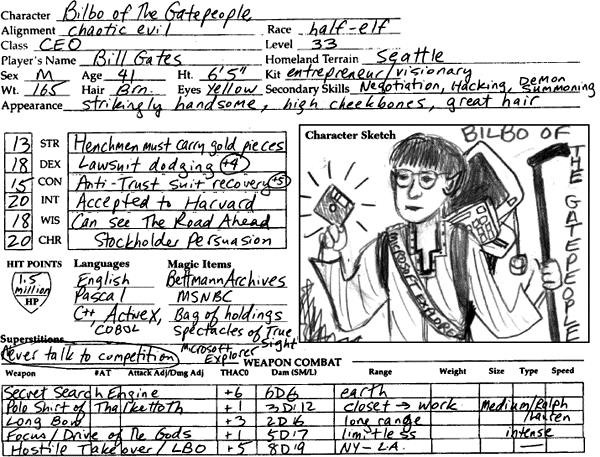OK, I lied to make the title more interesting. What I'm talking about - experienced groups that play well together - are a blessing, never a curse. Experienced roleplayers that despite their years in the hobby still suck are a curse, but you don't want to play with them anyway. So, let's have a look at the specific challenges you can run into with the more experienced and well-cooperating kinds of groups that I touched in the
last article already.
You see, players anticipating where you're going can lead to some hilarious misunderstandings. If players are accustomed to generally help the gamemaster along by not deliberately walking away from the adventure, they can get blind to the real danger the gamemaster lays out for them. "Over there lives a mighty dangerous sorcerer. You shouldn't go there!" the peasant says. "And on to adventure!" the heroes cry. Proceed to group whipeout.
 |
| But he has only initiative 4! |
Of course, there are easy fixes for this ("Do you REALLY want to go the EXTREMELY DANGEROUS BLACK SORCERER?"), but at times, players that are too committed to the mindset of a gamemaster can start ruining the fun for both sides. Usually, though, this kind of problem can be solved easily by meta-communication: simply speak about the problem off-time.
 |
| Clad like this, perhaps |
Now, if such groups tend to work with the gamemaster and anticipate the narrative needs, and we established this as a good thing - what exactly is there left for these groups to choose from? As I already said, choice, or more precisely the feeling that they are making meaningful choices, is important to the game. Whenever a game session starts feeling like it's on rails, you're gonna get problems.
 |
| Characters are obstacles in the way of plot progression! |
There are two main areas on which the players must be awarded choice as often as possible. The first thing is the obvious one: the means to the end. It doesn't make sense to let players choose the ends (because then you can't prepare and the players don't really know what they want or could want anyway), but the means to reach the ends are up to them. Sneak into the camp or attack frontal? Force someone to deliver information, eardrop or coerce with magic? The possibilities are endless, and for many people the reason why they like roleplaying in the first place. And rightly so.
 |
| Oftentimes, people start like this. |
The second area is a bit less obvious and more difficult to pull off, for both sides. It's long-term character development decisions. Character development is a crucial part of roleplaying, and one that is often neglected, often times forcefully by the demands of the outside world (too few sessions, group members changing, etc). It requires many different things to work, beside the outside demands I just mentioned, which I will take as a given.
First, the player must be familiar with his character. It is my experience that characters have to develop before they can develop. What do I mean with this? When you create a character for the first time, you often have specific ideas about what this character should be and where you want to go. Often, though, some of them turn out to be unfitting - for you, for the group, for the campaign - or simply sounded better on paper than they are in reality. It takes a few sessions - usually about three to five - to really grasp what you actually created in the character. It sounds counterintuitive, but that has been my experience.
 |
| Starts out as interesting character and becomes stupid. Try it the other way around. |
Second, player
and gamemaster need a sense of where they want to go with the development. If the goals are long-term - for example, become an overlord in your own right - you can create a steady progression. But for this to work, both sides need to know about it. This is true for any longer character development. A player who wants his character to descent into the dark side will certainly need the gamemaster for this transition, so speaking about it beforehand makes sense.
 |
| He now knows your name! |
Third, you need opportunities. Without a chance to win a land you will not become a noble, and without any cause, presence or mentor developing a downward spiral into evil is also difficult. Therefore, the gamemaster must present little opportunities that help the player to prod their characters down their paths. We're not talking about sessions or even plotlines dedicated to these characters; in my experience, that leads to too much downtime for the rest.
 |
| Diablo is my arch-nemesis! Stay away! |
No, what you need are the little moments. Someone commemorating the character. A minor relief that only he understands. A noble's name that he knows. The little things. It is even more important for you as gamemaster, though, to remember this stuff. It may seem trivial in comparison to the main plotline, but players usually remember it because it's what makes their characters. Try to call back these moments as often as possible when appropriate. That doesn't mean that they need to get rewards all the time; just remind them that neither you nor the world have forgotten.
The same is true about the "bad" decisions characters make. These decisions are often totally in-character, may even be sensical, but they leave a bad impression on the outside world (closing a city during a plague is prudent, but won't win you many Likes with the locals). Call back to these decisions, too.
The combination of all of these will help your group to make meaningful choices; meaningful not because of their impact on the ongoing plot - that really shouldn't be a concern - but because it allows for real roleplaying and the development of characters that actually deserve that name.










No comments:
Post a Comment